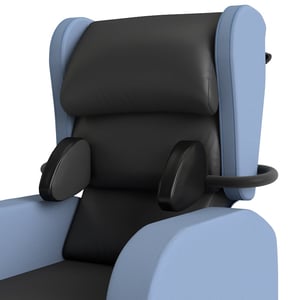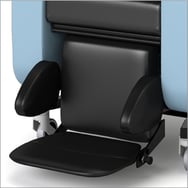An important part of seating a patient in a chair is achieving midline position where possible. One of the ways we try to do this is by using lateral supports on a chair.
BOOK A SEATING ASSESSMENT AT A TIME AND PLACE THAT SUITS YOU
What are Side Lateral Supports?
 Lateral supports are designed for postural support. These are typically used for clients who are needing thoracic or trunk support and help reduce development or further deterioration of scolosis, as well as promoting midline sitting for those that tend to lean to one side. These are an adjustable accessory which can be adjusted in width and height, and each lateral can be positioned differently as to best suit the patient. Lateral supports are interchangeable amongst all of the the Seating Matters range of chairs.
Lateral supports are designed for postural support. These are typically used for clients who are needing thoracic or trunk support and help reduce development or further deterioration of scolosis, as well as promoting midline sitting for those that tend to lean to one side. These are an adjustable accessory which can be adjusted in width and height, and each lateral can be positioned differently as to best suit the patient. Lateral supports are interchangeable amongst all of the the Seating Matters range of chairs.
Lateral supports can be used to encourage a midline posture when the patient is leaning to the side and cannot independently correct their position. This may be due to poor sitting balance, fatigue, or a curvature of the spine such as kyphosis or scoliosis. Leaning to one side creates an uneven weight distribution which increases pressure injury risk which can in extreme cases, can prove fatal.
How to Adjust Lateral Supports
You can watch this short video containing step-by-step instructions on how to quickly and easily adjust lateral supports.
Additional Supports: Leg Laterals
 Leg laterals are helpful for clients whose legs abduct and externally rotate. These also protect the feet from injury or objects in the path of chair movement, whilst keeping the feet supported on the footplate.
Leg laterals are helpful for clients whose legs abduct and externally rotate. These also protect the feet from injury or objects in the path of chair movement, whilst keeping the feet supported on the footplate.
*Note - the purpose of this blog is to give an overview of the product with some tips to consider on its use. This is not intended to be a substitute for professional or medical advice, diagnosis, prescription or treatment and does not constitute medical or other professional advice. For advice with your personal health or that of someone in your care, consult your doctor or appropriate medical professional.






